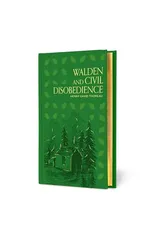WITH AN INTRODUCTION BY BENJAMIN MARKOVITS In 1845 Thoreau, a Harvard-educated 28-year-old, went to live by himself in the woods in Massachusetts. He stayed for over two years, living self-sufficiently in a small cabin built with his own hands. Walden is his personal account of the experience, in which he documents the beauty and fulfilment to be found in the wilderness, and his philosophical and political motivations for rejecting the materialism which continues to define our modern world.
Henry David Thoreau
Henry David Thoreau was an American essayist, poet, and philosopher known for his transcendentalist beliefs and writings on nature, simplicity, and civil disobedience. His most notable works include "Walden," a reflection on living a simple life in harmony with nature, and "Civil Disobedience," a call for individual resistance to unjust laws.
Thoreau's writing style is characterized by its introspective and philosophical nature, as well as its vivid descriptions of the natural world. His works have had a lasting impact on environmental literature and the development of the conservation movement. "Walden" remains his most famous work, exploring themes of self-reliance, individualism, and the importance of living deliberately. Thoreau's contributions to literature continue to inspire readers to seek a deeper connection with nature and live more intentionally.








